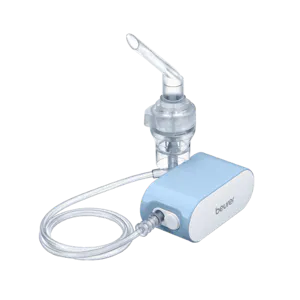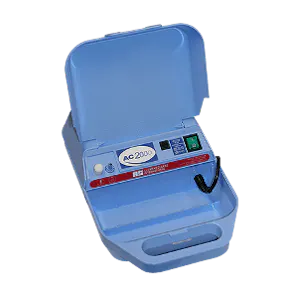What is a nebuliser?
If you are recommended a nebuliser then there's a few things you need to consider. We're here to help.

A nebuliser is a medical device
In medicine, a nebuliser (or nebulizer as it's sometimes spelt) is a delivery device used to administer medication in the form of a mist that's inhaled into the lungs. Nebulisers are often used for the treatment of respiratory diseases or disorders and they can be the best way to deliver a dose of medicine to someone who is struggling to breathe in an emergency situation. They can also be used by people who struggle with another device, such as an inhaler. Nebulisers aren’t used to treat mild or moderate symptoms as research has shown that in most cases a spacer can be just as effective. If you’re unsure at all you should contact your health professional before buying as it is they who will prescribe the medication.
Which nebuliser medication will depend on your symptoms and diagnosis. It may be as simple as 2.5ml of your bronchodilator (reliever), a small dose of saline to moisten your airways or a more complex regime involving steroids or possibly antibiotics. Your health professional will decide if you need to have one at home and how often you should nebulise. We can help you choose which type of nebuliser is suitable for your regime and your lifestyle.
How does it work?
Most nebulisers are attached to a compressor. This sucks in air through a filter, compresses it and pressurised air passes through the tube into the nebuliser chamber, turning the liquid medicine into a mist. You can then breathe in this mist through a mask or mouthpiece. During an asthma attack, respiratory infection or COPD exacerbation this mist may be easier to inhale than the spray from a pocket inhaler. When your airways become narrow you can’t take deep breaths. For this reason, a nebuliser can at times be a more effective way to deliver the medication than an inhaler, which requires you to take a deep breath.
Who needs a nebuliser?
If you suffer from COPD you may require one during an exacerbation or when your condition becomes more severe. Nebulisers can also be used to deliver medications to help reduce the thickness of your phlegm making it easier to cough it out, or to deliver antibiotics if you have a bacterial infection. Some medications target the build up of mucus and if you suffer from Cystic Fibrosis, Bronchiectasis or other lung diseases you may require a complex combination on a daily basis. Asthma however is rarely treated routinely with a nebuliser as for most people using a reliever with a spacer is equally effective.
How to choose?
If your health professional does suggest a nebuliser at home it’s important that your condition is properly assessed and monitored.
Whether you choose a compressor, ultrasonic or mesh type nebuliser, it’s vital that you know how to use it correctly as well as how to clean and care for it. If you are choosing for a relative, choose one you know they will be comfortable and confident with. You need to consider the medication prescribed but also your lifestyle and budget. Choose one from a reputable company who you know will be there when you need spares and accessories.
You need a nebuliser that is reliable and won’t let you down and a company that will be there for you if it does. There is lots of information on our website and useful advice on our blog. Our useful links are full of independent advice if you want to learn more about your medical condition.
We supply models and accessories from the following reputable manufacturers.
Photo credits: Hush Naidoo, Nathan Fertig






